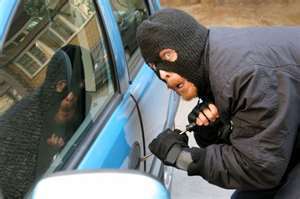NICB's Hot Wheels: America's 10 Most Stolen Vehicles
 |
A 50-50 Split between Domestic and Import
DES PLAINES, IL -- August 18, 2014: The National Insurance Crime Bureau (NICB) today released its annual Hot Wheels report which identifies the 10 most stolen vehicles in the United States. The report examines vehicle theft data submitted by law enforcement to the National Crime Information Center (NCIC) and determines the vehicle make, model and model year most reported stolen in 2013. Also in today’s release is a list of the top 25 2013 vehicle makes and models that were reported stolen in calendar year 2013.
For 2013, the most stolen vehicles* in the nation were (total thefts in parentheses):
1. Honda Accord (53,995)
2. Honda Civic (45,001)
3. Chevrolet Pickup (Full Size) (27,809)
4. Ford Pickup (Full Size) (26,494)
5. Toyota Camry (14,420)
6. Dodge Pickup (Full Size) (11,347)
7. Dodge Caravan (10,911)
8. Jeep Cherokee/Grand Cherokee (9,272)
9. Toyota Corolla (9,010)
10. Nissan Altima (8,892)
See the complete report here. Download an infographic here. To watch a video on Hot Wheels, click here.
The following are the top 10 2013 model year vehicles stolen during calendar year 2013:
1. Nissan Altima (810)
2. Ford Fusion (793)
3. Ford Pickup Full Size (775)
4. Toyota Corolla (669)
5. Chevrolet Impala (654)
6. Hyundai Elantra (541)
7. Dodge Charger (536)
8. Chevrolet Malibu (529)
9. Chevrolet Cruze (499)
10. Ford Focus (483)
Download 2013’s complete top 25 most stolen list from this spreadsheet.
After a slight increase in 2012, the FBI predicts a reduction in national vehicle thefts of 3.2 percent when final 2013 statistics are released later this year. The peak year for vehicle thefts was 1991 with 1,661,738. If the FBI’s preliminary 2013 vehicle theft estimate holds, thefts will be under 700,000—a number not seen since 1967 and a reduction in vehicle thefts of over 50 percent since 1991.
“The drop in thefts is good news for all of us,” said NICB President and CEO Joe Wehrle. “But it still amounts to a vehicle being stolen every 45 seconds and losses of over $4 billion a year. That’s why we applaud the vehicle manufacturers for their efforts to improve anti–theft technology and pledge to continue to work with our insurance company members and law enforcement to identify and seek vigorous prosecution of the organized criminal rings responsible for so many of these thefts.”
Nonetheless, drivers must still be vigilant and protect their vehicles from theft. NICB recommends its four “layers of protection” against theft:
Common Sense: Lock your car and take your keys. It’s simple enough, but many thefts occur because owners make it easy for thieves to steal their cars.
Warning Device: Having and using a visible or audible warning device is another item that can ensure that your car remains where you left it.
Immobilizing Device: Generally speaking, if your vehicle can’t be started, it can’t be stolen. “Kill” switches, fuel cut–offs and smart keys are among the devices that are extremely effective.
Tracking Device: A tracking device emits a signal to the police or to a monitoring station when the vehicle is stolen. Tracking devices are very effective in helping authorities recover stolen vehicles. Some systems employ “telematics,” which combine GPS and wireless technologies to allow remote monitoring of a vehicle. If the vehicle is moved, the system will alert the owner and the vehicle can be tracked via computer.
Considering a used vehicle purchase? Check out VINCheck℠, a free vehicle history service for consumers. Since 2005, NICB has offered this limited service made possible by its participating member companies. Check it out at: VinCheck.
Anyone with information concerning insurance fraud or vehicle theft can report it anonymously by calling toll–free 800–TEL–NICB (800–835–6422), texting keyword “fraud” to TIP411 (847411) or submitting a form on our website. Or, download the NICB Fraud Tips app on your iPhone or Android device.


